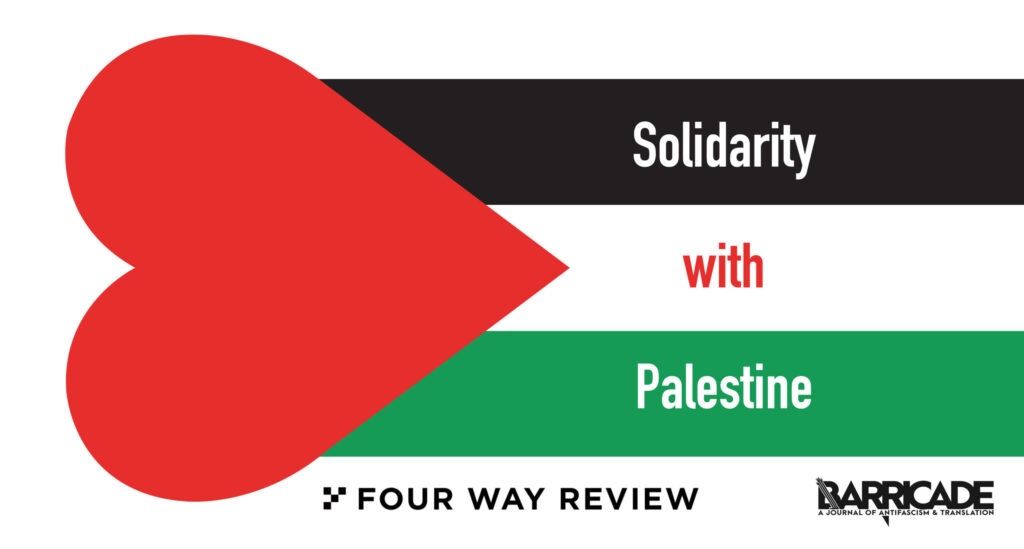
Mobile users: Reading in landscape mode is recommended.
DAY 21, WORDS ARE TOO POOR October 28, 2023

Mobile users: Reading in landscape mode is recommended.
DAY 21, WORDS ARE TOO POOR October 28, 2023

Hiba Abu Nada, a Palestinian novelist and poet, and winner of the Sharjah Prize for her novel Oxygen is Not for the Dead, was killed by Israeli airstrikes at her home in Gaza on Oct. 20. She was just 32 years old. The poem below, written by Angolan poet and journalist João Melo, alerts us to the brevity and precarity of the moment, after an act of violence occurs and before the official narrative of that violence is written, how we are obliged to speak in that moment the truth and reality that we know.
João Melo
translated from the Portuguese by G. Holleran
Excuse my urgency, oh right-thinking beings
especially you translucent
and self-referential poets,
but one of our sisters,
the Palestinian poet Hiba Abu Nada,
has just died in Gaza under the shrapnel of a benevolent bomb,
sent by another God,
different from the one she spoke with
every day.
I hesitated to convey this fateful news
so hastily. Perhaps I should wait
for the leaden grey smoke from the bomb that killed her to dissipate,
while she, surely,
scrutinized the sky for a sliver of light and
maybe even
the last birds.
Or, more convenient yet
it’d be better to say nothing,
until today’s hegemonic oracles,
like all oracles,
circulate an official statement
denying it as usual
without any doubts
or uncomfortable questions.
But when I read
the last words of Hiba Abu Nada before she died,
I was moved to spread this news,
before her banner could be censored
by those who defend selective liberty:
“If we die, know that we are content and steadfast,
and convey on our behalf that we are people of truth!”
João Melo, born in 1955 in Luanda, Angola, is an author, journalist, and communication consultant. He is a founder of the Angolan Writer’s Association, and of the Angolan Academy of Literature and Social Sciences. His works include poetry, short stories, articles, and essays and have been published in Angola, Portugal, Brazil, Italy, Cuba, the United Kingdom, and the United States. His writings have been translated into English, French, German, Arabic, and Chinese. He was awarded the 2009 Angola Arts and Culture National Prize in the literature category.
Grace Holleran is a writer, translator, and member of Barricade‘s editorial collective.
To read Barricade’s statement in solidarity with Palestine in response to the last escalation by Israel in 2021, click here.
For updates on local actions and demonstrations, we recommend checking the social media of local Palestinian advocacy organizations. For on-the-ground coverage in Gaza, we recommend Middle East Eye, Jewish Voice for Peace, and Motaz Azaiza. A list of other Instagram accounts can be found in the caption of this post. While social media gives visibility to the immediacy of the conditions in Gaza not shown in mainstream media, these accounts are also subject to censorship by Meta, so watch this space for updated links.
Some useful resources for education on Palestine’s history are Jadaliyya’s comprehensive reading list from 2021 and their currently-running Gaza Teach-in series (which can be accessed here along with other recent posts on Palestine), and Decolonize Palestine.
Country of Words is a rich resource for Palestinian literature, a re-mapping of Palestine’s literary history from a global perspective.
If you have the resources, consider donating to the Palestine Children’s Relief Fund, Medical Aid for Palestine’s urgent appeal, and Pal Legal (which gives protections to those losing their livelihoods for speaking out).
We urge readers in the United States to call and write their Congress representatives and demand they stand for a ceasefire.
One moment from August 12, 2017 that was discussed repeatedly during the course of the Sines trial was the march by members of League of the South (LOS), the Traditionalist Workers Party (TWP), and the National Socialist Movement (NSM) – groups that formed a coalition known as the Nationalist Front (NF) – from a parking garage on Market Street in Charlottesville to what was then called Emancipation Park about two blocks away (the park was previously named Lee Park and has since been renamed once again as Market Street Park). The conflict that occurred when that particular bloc of far right demonstrators clashed with counter-protesters was one of the most dramatic and widely documented events in an already tense and tragic day.

The NF bloc clearly came prepared to fight: many members of LOS and TWP wore helmets and carried uniform police riot shields. A number of them also had flagpoles that quickly became weapons (a practice that was frequently discussed on message boards beforehand). That day in Charlottesville, there were also antifascists who brought helmets, shields, and sometimes flagpoles, but as the NF members approached the park, they were confronted by a line of people who were simply locking arms with little to nothing to protect them. This fact makes the footage of that moment all the more gut-wrenching to watch. Ultimately, the NF groups all made their way into the park.
Continue reading “On Borrowed Language and Historical Continuity on the Far Right”In November 2016, Richard Spencer’s public profile took on a new degree of notoriety when The Atlantic released video of a speech he gave at the annual conference of the National Policy Institute, a white nationalist think tank then under Spencer’s leadership. The comment that yielded the most headlines came at the end when he cried out “Hail Trump! Hail our people! Hail victory!” as he raised a cocktail glass with a straight arm at a high angle to a cheering audience and at least a few Nazi salutes.
The phrase hail victory is, of course, historically linked to that gesture insofar as it is a translation of the German Sieg heil. That pairing of signs – one verbal and one corporeal – was also commonplace among alt-right participants. In a previously recorded deposition that was presented during the Sines trial, former Identity Evropa member Samantha Froelich was asked if she had heard “either Sieg heil or hail victory discussed within the alt-right.” She answered, “yes, at every social event I went to, that was said” and explained that it was associated with “the Roman or Nazi salute.” She even described a joke that was passed around among Identity Evropa members “where you would ask if you’ve seen my friend Kyle. ‘Did you see Kyle?’ Sieg heil? I hope you understand the wordplay here. And then you would do the Sieg heil and say, ‘Oh, he’s right over there’ and point your finger. ‘He’s about this tall’ [indicating a Nazi salute] and that was – that was the joke, is that you’re Sieg heil-ing in plain day.” Continue reading “The Sanctifying Language of the Alt-Right”
translated by Madeleine Collier
This essay, originally written by Subcomandante Marcos (Delegado Cero) in 1996, can be accessed in the original Spanish at the EZLN archives.
In the Lacandona jungle, in the southeastern Mexican state of Chiapas, there is a deserted settlement surrounded by heavily armed military posts. The name of this abandoned town was Guadalupe Tepeyac. Its inhabitants, the indigenous Tojolabals, were forcefully expelled by the Mexican government in February 1995, when federal troops sought to assassinate the leadership of the Zapatista Army of National Liberation [EZLN].
However, it is not the painful exile of these indigenous peoples, who pay for their rebellion by living in the mountains, of which I will tell you. I want to tell you about an architectural work that was born at the edge of the then-vibrant Guadalupe Tepeyac, in July and August of 1994. Largely illiterate–the most educated among them have a third grade education–, the Tojolabal architects undertook, in 28 days, to build a structure capable of housing 10,000 seats for the event the Zapatistas called the National Democratic Convention. In honor of Mexican history, the Zapatistas named the meeting place Aguascalientes. 1 The gigantic gathering space had an auditorium for 10,000 seated attendees and an 100-member presidium, a library, a computer room, kitchens, sleeping quarters, and parking. It even, it is said, included an “area for staging attacks.”
Ramparts: A Barricade Forum is currently seeking contributions for our next themed series, “Architectures of Antifascism.” From the physical structures of antifascist struggle (the barricade, the autonomous zone, the agricultural collective), to digital configurations (the VPN, the net commons, CV dazzle) and spatial language which describes organizational relationships (distribution, horizontality, the cell, the web) how do antifascist entities use and maneuver within space? We welcome text and media submissions which engage the spatial aspect of resistance from the micro-level of design to large-scale configurations of transnational solidarity.
Send your submissions and pitches to submissions@barricadejournal.org.
In a chapter for the Routledge Handbook of Translation and Activism, published over the summer, Turkish journalist and translator Ayşe Düzkan offers an anecdote: At a conference in Istanbul in 2014, she was tasked with providing a consecutive Turkish interpretation for one of the speakers, a British Marxian anthropologist. His comments centered on the Gezi Park uprisings that had captured the world’s attention just a year before. Though it was only his second visit to the city, he did not seem to recognize the irony in speaking to a Turkish audience, many of whom were directly involved in the protests, about an event in which he was not himself involved, and in a language they do not speak. Would a Turkish writer with no knowledge of English be invited to comment on Occupy London, she wonders? That such a scenario seems unlikely is no coincidence. The absurd performance Düzkan observes illustrates how the politics of translation affect not only the distribution of linguistic access (so that desired information may be limited for speakers of a certain language), but also the distribution of intellectual authority (so that speakers of a certain language may be ‘taught’ their own history through an interpreter).
Transit Books is a young press—it was founded in 2015 with the aim of bringing an open-minded and international sensibility to an industry that is notorious for its insularity and resistance to the unknown. The risk of starting a new business and choosing to focus on the areas that conventional wisdom describes as the most challenging (translations, novellas, literary and narrative nonfiction) paid off for Transit Books. The fiction and nonfiction that they publish all display a powerful intimacy that perhaps is one explanation for their unlikely successes. One of their first books, Swallowing Mercury by Wioletta Greg, was longlisted for the Man Booker Prize, and several others had prominent critical acclaim and sales success.